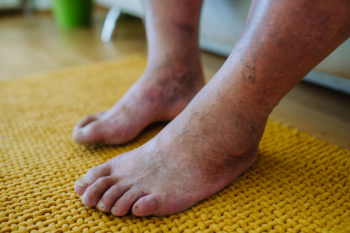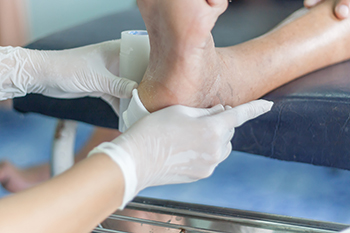Oceanside (760) 630-9200
October 2024
How Diabetes Can Affect the Feet

Diabetes can have serious effects on the feet due to poor circulation and nerve damage, known as diabetic neuropathy. Reduced blood flow to the feet can delay the healing of cuts, blisters, or sores, increasing the risk of infections and, in severe cases, leading to ulcers or even amputation. Neuropathy can cause a loss of sensation in the feet, making it harder to detect injuries or changes in skin condition, which can go unnoticed and worsen over time. A podiatrist plays a critical role in diabetic foot care. They can perform regular foot exams to identify problems early, treat wounds, and recommend proper footwear or custom orthotics to prevent pressure points. Podiatrists also offer guidance on daily foot care routines, such as inspecting feet for sores and maintaining good hygiene. If you have diabetes, it is strongly suggested that you schedule routine podiatric visits to help manage diabetes-related foot complications and reduce the risk of serious issues.
Diabetic foot care is important in preventing foot ailments such as ulcers. If you are suffering from diabetes or have any other concerns about your feet, contact Dr. Jeff Brooks from Oceanside Foot & Ankle Center. Our doctor can provide the care you need to keep you pain-free and on your feet.
Diabetic Foot Care
Diabetes affects millions of people every year. The condition can damage blood vessels in many parts of the body, especially the feet. Because of this, taking care of your feet is essential if you have diabetes, and having a podiatrist help monitor your foot health is highly recommended.
The Importance of Caring for Your Feet
- Routinely inspect your feet for bruises or sores.
- Wear socks that fit your feet comfortably.
- Wear comfortable shoes that provide adequate support.
Patients with diabetes should have their doctor monitor their blood levels, as blood sugar levels play such a huge role in diabetic care. Monitoring these levels on a regular basis is highly advised.
It is always best to inform your healthcare professional of any concerns you may have regarding your feet, especially for diabetic patients. Early treatment and routine foot examinations are keys to maintaining proper health, especially because severe complications can arise if proper treatment is not applied.
If you have any questions please feel free to contact our office located in Oceanside, CA . We offer the newest diagnostic and treatment technologies for all your foot and ankle needs.
Arthritis Can Cause Pain in the Feet and Ankles
Wound Care
Diabetics must be wary of all wounds, regardless of depth or size. Diabetes, a chronic disease in which the body cannot properly use glucose the way it normally would, causes various complications that make wounds difficult to heal. Nerve damage or neuropathy will cause diabetics to have trouble feeling the pain of a blister or cut until the condition has significantly worsened or become infected. A diabetic’s weakened immune system can make even the most minor of wounds easily susceptible to infection. Diabetics are also more prone to developing narrow, clogged arteries, and are therefore more likely to develop wounds.
Wounds should be taken care of immediately after discovery, as even the smallest of wounds can become infected if enough bacteria build up within the wound. To remove dirt, wounds should be first rinsed under running water only. Soap, hydrogen peroxide, or iodine can irritate the injury and should be avoided. To prevent infection, apply antibiotic ointment to the wound and cover it with a bandage. The bandage should be changed daily. The skin around the wound may be cleaned with soap.
To prevent further exacerbation, see a doctor—especially if you have diabetes. Minor skin conditions can become larger problems if not properly inspected. As the wound heals, make sure to avoid applying pressure to the affected area.
Managing Cuts on the Bottom of the Feet

Managing cuts on the bottom of the feet, which requires prompt and careful attention to prevent infection and promote healing, is often done by a podiatrist. This type of doctor will start by cleaning the wound thoroughly with mild soap and water to remove any debris and reduce the risk of infection. This is generally followed by gently patting the area dry with a clean cloth or gauze. The doctor will then apply an antiseptic to the cut to further disinfect the area, and cover the wound with a sterile adhesive bandage or dressing to protect it from dirt and friction. The dressing will be secure but not too tight, allowing for comfort and breathability. Regularly changing the dressing and monitoring the cut for signs of infection, such as increased redness, swelling, or discharge will be recommended. If you have a cut on the bottom of your foot, it is suggested that you schedule an appointment with a podiatrist who can offer you effective treatment.
Wound care is an important part in dealing with diabetes. If you have diabetes and a foot wound or would like more information about wound care for diabetics, consult with Dr. Jeff Brooks from Oceanside Foot & Ankle Center. Our doctor will assess your condition and provide you with quality foot and ankle treatment.
What Is Wound Care?
Wound care is the practice of taking proper care of a wound. This can range from the smallest to the largest of wounds. While everyone can benefit from proper wound care, it is much more important for diabetics. Diabetics often suffer from poor blood circulation which causes wounds to heal much slower than they would in a non-diabetic.
What Is the Importance of Wound Care?
While it may not seem apparent with small ulcers on the foot, for diabetics, any size ulcer can become infected. Diabetics often also suffer from neuropathy, or nerve loss. This means they might not even feel when they have an ulcer on their foot. If the wound becomes severely infected, amputation may be necessary. Therefore, it is of the upmost importance to properly care for any and all foot wounds.
How to Care for Wounds
The best way to care for foot wounds is to prevent them. For diabetics, this means daily inspections of the feet for any signs of abnormalities or ulcers. It is also recommended to see a podiatrist several times a year for a foot inspection. If you do have an ulcer, run the wound under water to clear dirt from the wound; then apply antibiotic ointment to the wound and cover with a bandage. Bandages should be changed daily and keeping pressure off the wound is smart. It is advised to see a podiatrist, who can keep an eye on it.
If you have any questions, please feel free to contact our office located in Oceanside, CA . We offer the newest diagnostic and treatment technologies for all your foot care needs.






